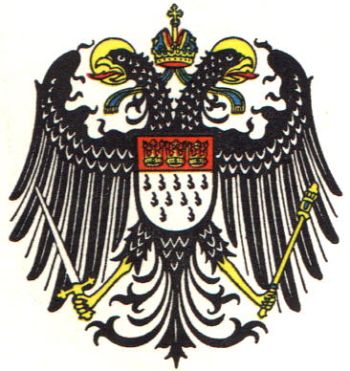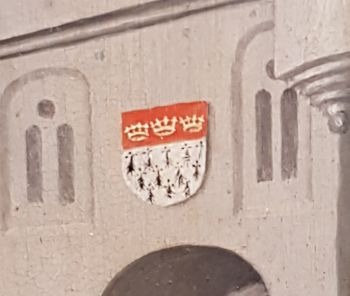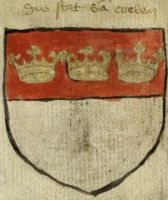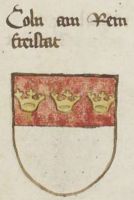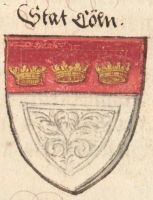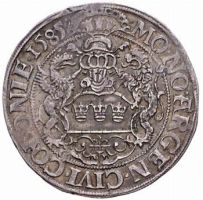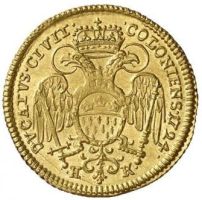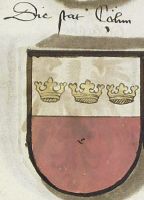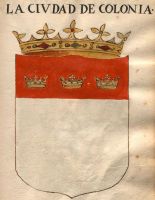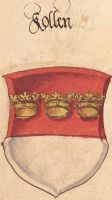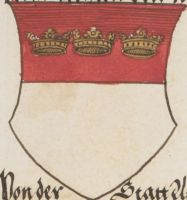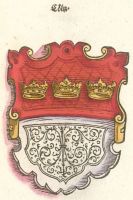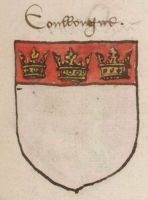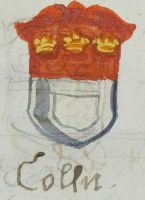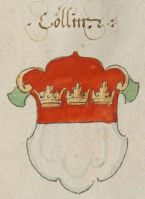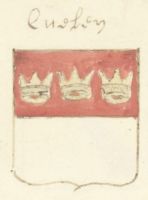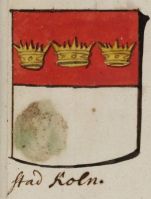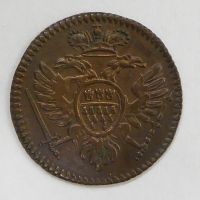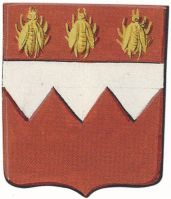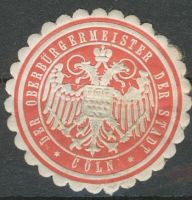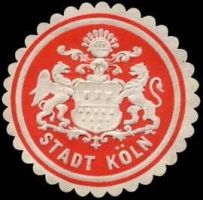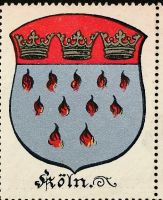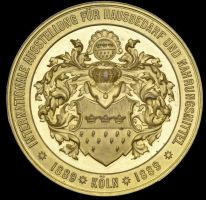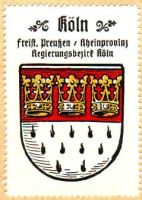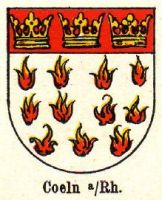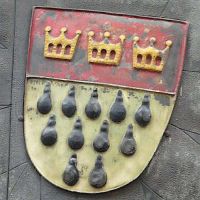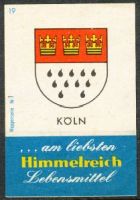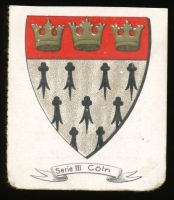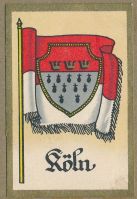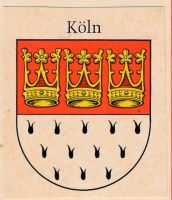Köln: Difference between revisions
Knorrepoes (talk | contribs) m (Text replace - "The arms in the Kaffee Hag albums +/- 1925 " to "The arms by Hupp in the Kaffee Hag albums +/- 1925 ") |
Knorrepoes (talk | contribs) m (Text replacement - "''' :" to "''':") |
||
| (55 intermediate revisions by 2 users not shown) | |||
| Line 1: | Line 1: | ||
{| | {| class="wikitable" | ||
|- style="vertical-align:top;" | |||
| | |[[File:koln.jpg|center|350 px|alt=Wappen von {{PAGENAME}}/Arms (crest) of {{PAGENAME}}]] | ||
| | |||
<center>''' {{uc:{{PAGENAME}}}} '''</center><br> | |||
'''Country''': Germany [[File:germany.jpg|60 px|right]]<br><br><br><br> | |||
'''State''': [[Nordrhein-Westfalen]][[File:Nordrhei.jpg|60 px|right]]<br><br><br><br> | |||
'''District (Kreis)''': Urban District (Kreisfreie Stadt)<br> | |||
'''Additions''': (to see click on expand)<br> | |||
<div class="mw-collapsible mw-collapsed"> | |||
* 1888 Bayenthal | |||
* 1888 Bickendorf | |||
* 1888 Bilderstöckchen | |||
* 1888 Bocklemünd | |||
* 1888 Braunsfeld | |||
* 1888 Deutz | |||
* 1888 [[Ehrenfeld]] | |||
* 1888 Heimersdorf | |||
* 1888 Humboldt | |||
* 1888 [[Kalk]] | |||
* 1888 Klettenberg | |||
* 1888 Kriel | |||
* 1888 Lindenthal | |||
* 1888 Lindweiler | |||
* 1888 Marienburg | |||
* 1888 Mauenheim | |||
* 1888 Müngersdorf | |||
* 1888 Neuehrenfeld | |||
* 1888 Niehl | |||
* 1888 Nippes | |||
* 1888 Ossendorf | |||
* 1888 Poll | |||
* 1888 Raderberg | |||
* 1888 Raderthal | |||
* 1888 Riehl | |||
* 1888 Vogelsang | |||
* 1888 Volkhoven | |||
* 1888 Weidenpesch | |||
* 1888 Zollstock | |||
* 1914 [[Brück (Köln)|Brück]] | |||
* 1914 Buchforst | |||
* 1914 Buchheim | |||
* 1914 Dellbrück | |||
* 1914 Dünnwald | |||
* 1914 Flittard | |||
* 1914 Höhenhaus | |||
* 1914 Holweide | |||
* 1914 Merheim | |||
* 1914 [[Mülheim am Rhein]] | |||
* 1914 Ostheim | |||
* 1914 Rath | |||
* 1914 Stammheim | |||
* 1922 Chorweiler | |||
* 1922 Fühlingen | |||
* 1922 Merkenich | |||
* 1922 Roggendorf/Thenhoven | |||
* 1922 Seeberg | |||
* 1922 [[Worringen]] | |||
* 1975 Eil | |||
* 1975 Elsdorf | |||
* 1975 Ensen | |||
* 1975 Esch/Auweiler | |||
* 1975 Godorf | |||
* 1975 Gremberghoven | |||
* 1975 Grengel | |||
* 1975 Hahnwald | |||
* 1975 Immendorf | |||
* 1975 Junkersdorf | |||
* 1975 Langel | |||
* 1975 Libur | |||
* 1975 Lind | |||
* 1975 [[Lövenich]] | |||
* 1975 Meschenich | |||
* 1975 Pesch | |||
* 1975 [[Porz]] | |||
* 1975 [[Rodenkirchen (Köln)|Rodenkirchen]] | |||
* 1975 Sürth | |||
* 1975 Urbach | |||
* 1975 Wahn | |||
* 1975 Wahnheide | |||
* 1975 Weiden | |||
* 1975 Weiss | |||
* 1975 Westhoven | |||
* 1975 Widdersdorf | |||
* 1975 Zündorf | |||
* 1989 Blumenberg | |||
* 1993 Neubrück | |||
<br> | |||
</div> | |||
{{#display_map:50.9359,6.9583|width=250|height=250|zoom=7}} | |||
|} | |||
{| class="wikitable" | |||
|+Official blazon | |||
|- | |||
|'''German''' | |||
| Ein golden nimbierter, golden bewehrter, rot gezungter schwarzer Doppeladler mit silbernem Schwert und goldenem Zepter in den Fängen, über den Köpfen schwebend eine goldene Kaiserkrone; im Brustschild unter rotem Schildhaupt, darin nebeneinander drei goldene Kronen, in Silber 11 schwarze Flammen im Verhältnis 5:4:2. | |||
|- | |||
|'''English''' | |||
| A double-headed eagle sable, holoed Or, armed, beaked and membered gules, in the claws a sword Argent and a sceptre Or, between the heads an imperial crown couped Or; charged with a breast shield: a chief gules, charged with three crowns Or, Argent, 11 flames sable in ratio 5:4:2. | |||
|} | |||
===Origin/meaning=== | |||
Köln (Cologne) was one of the most important towns in Germany. It got city rights early in the 12<sup>th</sup> century. The oldest seals, dating from 1149, only showed St. Peter, the patron saint of the city. The saint itself, nor its symbol, two crossed keys, appeared in the arms of the city itself. They do appear, together with a black cross, the symbol of the [[Köln (State)|State of Köln]], in many civic arms around the city (see f.e. [[Xanten]]). | Köln (Cologne) was one of the most important towns in Germany. It got city rights early in the 12<sup>th</sup> century. The oldest seals, dating from 1149, only showed St. Peter, the patron saint of the city. The saint itself, nor its symbol, two crossed keys, appeared in the arms of the city itself. They do appear, together with a black cross, the symbol of the [[Köln (State)|State of Köln]], in many civic arms around the city (see f.e. [[Xanten]]). | ||
The three crowns, symbolising the three Holy Kings, first appeared in 1315, in a chief above a silver shield. Relics of the Three Kings were taken to the city in 1164 by Emperor Friedrich Barbarossa. Later (around 1500) the shield was 'filled' with ermine. Officially there are 11 ermine tails, symbolising the 11.000 virgins of Saint Ursula. As St. Ursula was a princess of Bretagne (Brittany) the virgins were depicted as ermine tails. The arms of [[Bretagne|Brittany]] are a plain shield of ermine. | The three crowns, symbolising the three Holy Kings, first appeared in 1315, in a chief above a silver shield. Relics of the Three Kings were taken to the city in 1164 by Emperor Friedrich Barbarossa. Later (around 1500) the shield was 'filled' with ermine. Officially there are 11 ermine tails, symbolising the 11.000 virgins of Saint Ursula. As St. Ursula was a princess of Bretagne (Brittany) the virgins were depicted as ermine tails. The arms of [[Bretagne|Brittany]] are a plain shield of ermine. | ||
{|align="center" | |||
|align="center"|[[File:koln1482.jpg|center|Wapen van/Blason de {{PAGENAME}}]] <br/>The arms on a painting from 1481 (Groeningemuseum, Brugge) | |||
|} | |||
The original description in the legend of St. Ursula read XI m. virg. This has to be translated as 11 martyred virgins, not as 11.000 (M for 1000) virgins... | The original description in the legend of St. Ursula read XI m. virg. This has to be translated as 11 martyred virgins, not as 11.000 (M for 1000) virgins... | ||
| Line 29: | Line 118: | ||
The Imperial Eagle was granted in the 15<sup>th</sup> century and symbolised the rank of free imperial city. The arms were granted in 1817 and confirmed in 1897. | The Imperial Eagle was granted in the 15<sup>th</sup> century and symbolised the rank of free imperial city. The arms were granted in 1817 and confirmed in 1897. | ||
===Image gallery=== | |||
| | <gallery widths=250px heights=200px perrow=0> | ||
File:Kölngo.jpg|alt=Wappen von Köln/Arms (crest) of Köln|The arms in the Armorial Gorrevod (1460) | |||
| | File:Kölncg116.jpg|alt=Wappen von Köln/Arms (crest) of Köln|The arms in a 15th century manuscript | ||
|- | File:Köln1500.jpg|alt=Wappen von Köln/Arms (crest) of Köln|The arms around 1500 | ||
| | File:Köln1514.jpg|Wappen von Köln/Arms (crest) of KölnThe arms in a manuscript from 1514 | ||
| | File:Kölnc1.jpg|alt=Wappen von Köln/Arms (crest) of Köln|The arms on a 1585 coin | ||
| | File:Kölnc2.jpg|alt=Wappen von Köln/Arms (crest) of Köln|The arms on a 1724 coin | ||
File:Kölnjr.jpg|alt=Wappen von Köln/Arms (crest) of Köln|The arms in the Armorial Jörg Rügen (1495) | |||
File:Köln6.jpg|alt=Wappen von Köln/Arms (crest) of Köln|The arms in a 16th century Spanish manuscript | |||
File:Köln1565.jpg|alt=Wappen von Köln/Arms (crest) of Köln|The arms in a manuscript from 1565 | |||
File:Köln1576.jpg|alt=Wappen von Köln/Arms (crest) of Köln|The arms in a manuscript from 1576 | |||
File:Kölngb.jpg|alt=Wappen von Köln/Arms (crest) of Köln|The arms in a manuscript from 1584 | |||
File:Köln1543.jpg|alt=Wappen von Köln/Arms (crest) of Köln|The arms in the 16th century | |||
File:Köln16.jpg|alt=Wappen von Köln/Arms (crest) of Köln|The arms in a [[:Category:Windhag city arms|16th century manuscript]] | |||
File:Köln17.jpg|alt=Wappen von Köln/Arms (crest) of Köln|The arms in a 17th century manuscript | |||
File:Köln1650.jpg|alt=Wappen von Köln/Arms (crest) of Köln|The arms in 1650 | |||
File:Köln.hes.jpg|alt=Wappen von Köln/Arms (crest) of Köln|The arms in the [[Wapen- en Vlaggenboek Hesman|Wapen- en Vlaggenboek]] van Gerrit Hesman (1708) | |||
File:Köln18.jpg|alt=Wappen von Köln/Arms (crest) of Köln|The arms on a token, 1790s | |||
File:Kölnnap.jpg|alt=Wappen von Köln/Arms (crest) of Köln|The arms granted by Napoleon I | |||
File:kolnz1.jpg|alt=Wappen von Köln/Arms (crest) of Köln|Seal from around 1900 | |||
File:kolnz2.jpg|alt=Wappen von Köln/Arms (crest) of Köln|Seal from around 1900 | |||
File:koln.sc.jpg|alt=Wappen von Köln/Arms (crest) of Köln|The arms in an [[Schuberts Album deutscher Staaten und Städtewappen|album]] from around 1910 | |||
File:Kölnm1.jpg|alt=Wappen von Köln/Arms (crest) of Köln|The arms on a medal (1889) | |||
File:koln.hagd.jpg|alt=Wappen von Köln/Arms (crest) of Köln|The arms by [[Otto Hupp|Hupp]] in the [[Kaffee Hag albums]] +/- 1925 | |||
File:koln3.jpg|alt=Wappen von Köln/Arms (crest) of Köln|The arms as shown around 1900 | |||
File:Kölng.jpg|alt=Wappen von Köln/Arms (crest) of Köln|The arms in the city ([http://www.gevelstenen.net/kerninventarisatie/images/Keulen/Martinstrasse%2029-37%20IV.jpg source]) | |||
File:Koln.him.jpg|alt=Wappen von Köln/Arms (crest) of Köln|The arms on a [[Himmelreich|matchbox label]] | |||
File:koln.cva.jpg|alt=Wappen von Köln/Arms (crest) of Köln|The arms in an [[Continentale Verlags-Anstalt|album]] +/- 1905 | |||
File:koln.kos.jpg|alt=Wappen von Köln/Arms (crest) of Köln|The arms in an [[Kosmos Deutsche Stadtwappen aus West und Ost|album]], 1950s | |||
File:Köln.pan.jpg|alt=Wappen von Köln/Arms (crest) of Köln|The arms in an [[Panorama Bilderdienst|album]] from 1968 | |||
</gallery> | |||
[[Civic Heraldry Literature - Germany|'''Literature''']]: Stadler, 1964-1971, 8 volumes. Nagel, Rolf: Rheinisches Wappenbuch. Rheinland-Verlag, Köln 1986; S. 119 ISBN 3-7927-0816-7 | |||
{{de}} | |||
{{media}} | {{media}} | ||
[[Category:German Municipalities K|Koln]] | [[Category:German Municipalities K|Koln]] | ||
Latest revision as of 08:44, 16 June 2024
|
Country: Germany State: Nordrhein-Westfalen District (Kreis): Urban District (Kreisfreie Stadt)
|
| German | Ein golden nimbierter, golden bewehrter, rot gezungter schwarzer Doppeladler mit silbernem Schwert und goldenem Zepter in den Fängen, über den Köpfen schwebend eine goldene Kaiserkrone; im Brustschild unter rotem Schildhaupt, darin nebeneinander drei goldene Kronen, in Silber 11 schwarze Flammen im Verhältnis 5:4:2. |
| English | A double-headed eagle sable, holoed Or, armed, beaked and membered gules, in the claws a sword Argent and a sceptre Or, between the heads an imperial crown couped Or; charged with a breast shield: a chief gules, charged with three crowns Or, Argent, 11 flames sable in ratio 5:4:2. |
Origin/meaning
Köln (Cologne) was one of the most important towns in Germany. It got city rights early in the 12th century. The oldest seals, dating from 1149, only showed St. Peter, the patron saint of the city. The saint itself, nor its symbol, two crossed keys, appeared in the arms of the city itself. They do appear, together with a black cross, the symbol of the State of Köln, in many civic arms around the city (see f.e. Xanten).
The three crowns, symbolising the three Holy Kings, first appeared in 1315, in a chief above a silver shield. Relics of the Three Kings were taken to the city in 1164 by Emperor Friedrich Barbarossa. Later (around 1500) the shield was 'filled' with ermine. Officially there are 11 ermine tails, symbolising the 11.000 virgins of Saint Ursula. As St. Ursula was a princess of Bretagne (Brittany) the virgins were depicted as ermine tails. The arms of Brittany are a plain shield of ermine.
| The arms on a painting from 1481 (Groeningemuseum, Brugge) |
The original description in the legend of St. Ursula read XI m. virg. This has to be translated as 11 martyred virgins, not as 11.000 (M for 1000) virgins...
The colours of the shield are the colours of the Hanseatic league, the major league of merchant cities in the early Middle Ages. Köln was a founding member of the league.
The Imperial Eagle was granted in the 15th century and symbolised the rank of free imperial city. The arms were granted in 1817 and confirmed in 1897.
Image gallery
The arms in a 16th century manuscript
The arms in the Wapen- en Vlaggenboek van Gerrit Hesman (1708)
The arms in an album from around 1910
The arms by Hupp in the Kaffee Hag albums +/- 1925
The arms in the city (source)
The arms on a matchbox label
The arms in an album +/- 1905
The arms in an album, 1950s
The arms in an album from 1968
Literature: Stadler, 1964-1971, 8 volumes. Nagel, Rolf: Rheinisches Wappenbuch. Rheinland-Verlag, Köln 1986; S. 119 ISBN 3-7927-0816-7
This page is part of the German heraldry portal Deutsche Wappensammlung |
Heraldry of the World |
|
German heraldry:
|
Selected collector's items from Germany:
|
Contact and Support
Partners:
Your logo here ?
Contact us
© since 1995, Heraldry of the World, Ralf Hartemink 
Index of the site
